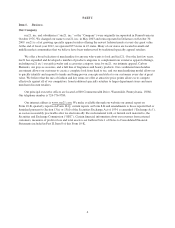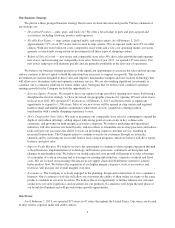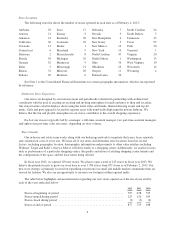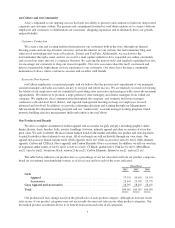Rue 21 2012 Annual Report Download - page 18
Download and view the complete annual report
Please find page 18 of the 2012 Rue 21 annual report below. You can navigate through the pages in the report by either clicking on the pages listed below, or by using the keyword search tool below to find specific information within the annual report.We plan to use cash from operations to fund our expanding business and execute on our growth strategy and
risks associated with leasing substantial amounts of space, including future increases in occupancy costs,
could have a negative impact on our cash flow.
To support our expanding business and execute our growth strategy, we will need significant amounts of cash
from operations, including funds to pay our lease obligations, build out new store spaces, purchase inventory, pay
personnel, further invest in our infrastructure and facilities, and pay for the increased costs associated with
establishing an e-commerce sales channel. In particular, payments under the operating leases associated with our
stores and our distribution facility account for a significant portion of our operating expenses.
Our substantial operating lease obligations could have significant negative consequences, including:
• requiring that a substantial portion of our available cash be applied to pay our rental obligations, thus
reducing cash available for other purposes;
• increasing our vulnerability to general adverse economic and industry conditions;
• limiting our flexibility in planning for or reacting to changes in our business or in the industry in which we
compete; and
• limiting our ability to obtain additional financing.
Any of these consequences could place us at a disadvantage with respect to our competitors. We depend on
cash flow from operations to pay our lease expenses and to fulfill our other cash needs. If our business does not
generate sufficient cash flow from operations to fund these activities or we experience working capital leverage
deterioration, and sufficient funds are not otherwise available to us under our senior secured credit facility, we may
need additional equity or debt financing. If such financing is not available to us on satisfactory terms, our ability to
run and expand our business or to respond to competitive pressures would be limited and we could be required to
delay, significantly curtail or eliminate planned store openings or operations or other elements of our growth
strategy.
Additional sites that we lease may be subject to long-term non-cancelable leases if we are unable to negotiate
our current standard lease terms. If an existing or future store is not profitable, and we decide to close it, we may
nonetheless be committed to perform our obligations under the applicable lease including, among other things,
paying the base rent for the balance of the lease term. Moreover, even if a lease has an early cancellation clause, we
may not satisfy the contractual requirements for early cancellation under that lease. Our inability to enter into new
leases or renew existing leases on terms acceptable to us or be released from our obligations under leases for stores
that we close would materially adversely affect us.
Accounting regulatory authorities have indicated that they may begin to require lessees to capitalize operating
leases in their financial statements in the next few years. If adopted, such a change would require us to record a
significant amount of lease related assets and liabilities on our balance sheet and make other changes to the
recording and classification of lease related expenses on our statement of operations and cash flows. This and other
future changes to accounting rules or regulations or the questioning of current accounting practices in regard to
leases may materially impact the presentation of our results of operations.
Our ability to obtain merchandise at competitive prices depends primarily on our sourcing relationships and
the ability of our vendors to manufacture and supply us with merchandise, and any events that adversely affect
our vendors or their ability to obtain financing for their operations could disrupt merchandise deliveries and
result in lost sales and profitability.
We do not own or operate any manufacturing facilities. We purchase all of our merchandise from third-party
vendors. There can be no assurance that we will be able to acquire desired merchandise in sufficient quantities on
acceptable terms or at all in the future, especially if we need significantly greater amounts of inventory in
connection with the growth of our business. Any inability to acquire suitable merchandise in sufficient quantities
and at acceptable prices, in particular exclusive merchandise, due to the loss of or deterioration or change in our
14
























